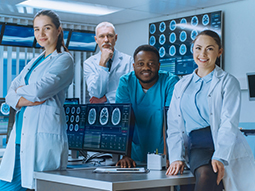Aphasia occurs when the parts of the brain that control language are damaged, and it results in obstructed speaking, listening, reading, and/or writing. It most often results from stroke, but can be brought about from other brain injury or even brain tumors.
Aphasia Clinic
The Aphasia Clinic is designed for those who have experienced a recent stroke or other injury to the brain with resulting problems. It is also appropriate for individuals who have previously been diagnosed with aphasia and want to improve their communication skills, even years after their illness or injury.
Therapy focuses on the real-life goals of people affected by this condition, including:
- Strengthening daily participation in life activities and social connections, and promoting emotional well-being.
- Focusing on each client’s unique language challenges, and participating in specialized groups to help clients improve communication skills.
Patients have access to the comprehensive rehabilitation services at MedStar Health, including psychologists, and physical and occupational therapists, and individuals may also be eligible to participate in research studies on aphasia offered through MedStar Health Research Institute. Learn more below.
Support groups
Numerous support groups are available, including:
- Mentorship Program: People living with aphasia are matched with volunteer mentors who have been through the same experience.
- Speech-Language Therapy: Therapy focuses on the real-life goals of people affected by aphasia, strengthening daily participation in life activities and social connections.
- Computer Lab Group: Participants practice listening, speaking, reading, and writing using state-of-the-art computer programs and applications.
- Reading Strategies: Participants practice decoding words faster and improving reading comprehension.
- Book Group: Participants share the experience of reading by using outlines, simplified text, pictures, and auditory support through e-readers or audiotapes.
- Motor Speech Group: For individuals with apraxia of speech, a condition that affects the motor planning abilities required for speech.
- Dysarthria Group: For individuals with dysarthria, a condition in which the face and mouth muscles are weak, move slowly, are uncoordinated, and distort speech.
- Augmentative and Alternative Communication Clinic: We work closely with vendors to provide a range of augmentative and alternative communication devices.
The hallmark of the clinic's approach is its comprehensive language and medical evaluation of each participant. This unique collaborative assessment helps the clinic team pinpoint the precise areas of the brain affected by stroke or brain injury, and characterize the type of aphasia clients are experiencing. The team uses this information to both better understand the individual's problem and make recommendations for additional management options.
Our providers

Expert neurology and neurosurgical care
Getting the care you need starts with seeing one of our physicians.









